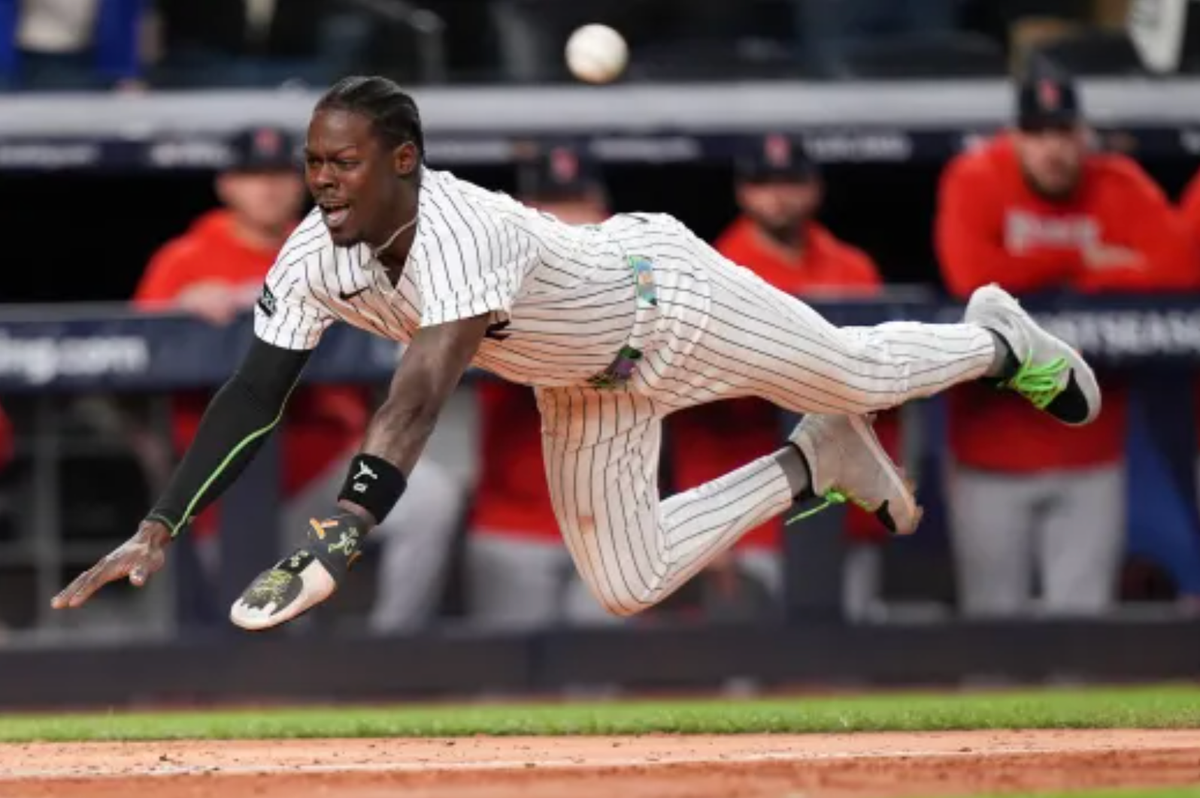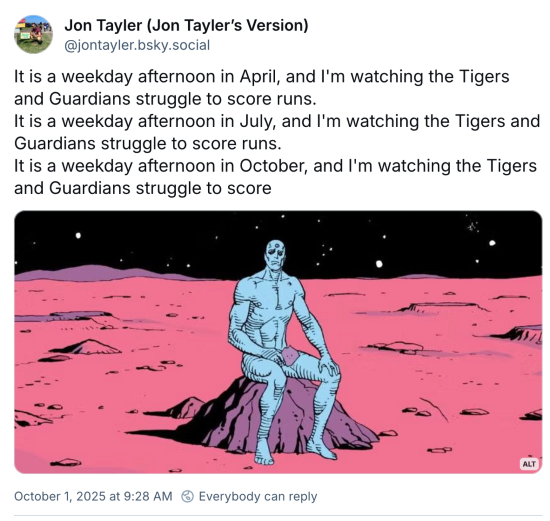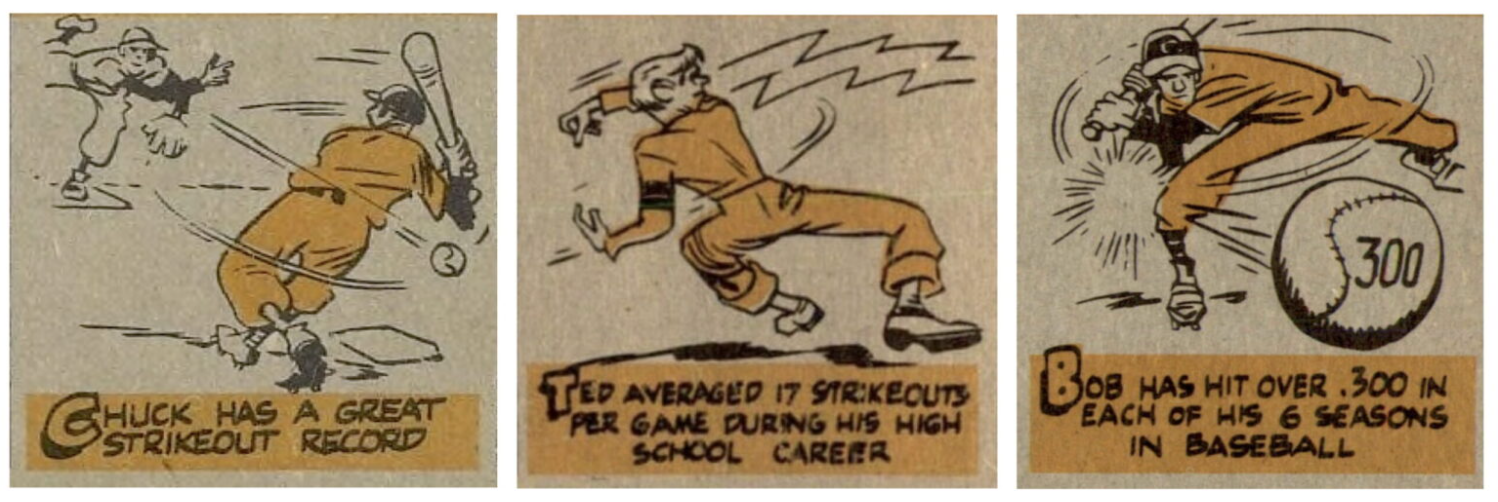Cup of Coffee: October 2, 2025
The Dodgers advance, the Guardians, Padres and Yankees force a Game 3, some managerial news, the Rockies sack their GM, Topps baseball card cartoons, swallowing live frogs, and the death of Jane Goodall

Good morning! And welcome to Free Thursday!
Also: happy birthday to my mom, who turns [redacted] today. But I'm 52 so give it a guess and you're likely to be in the ballpark. Happy birthday, mom!
And That Happened
Here are the scores. Here are the highlights:
Guardians 6, Tigers 1: Midway through yesterday's game Jon Tayler captured the flavor of this game, this series, and the Tigers and Guardians' whole deal:

Someone in Cleveland's dugout must've seen that because soon after it posted the Guardians, who had only two hits in the first seven innings of the game, ripped off a five-run eighth inning featuring a go-ahead solo homer from Brayan Rocchio and a three-run shot from Bo Naylor. George Valera had homered in the first inning. The win forces a deciding game three today. If Cleveland wins they will become the first team in the (short) history of best-of-three Wild Card series to win it after losing the first game.
Padres 3, Cubs 0: The Padres likewise pulled even, with four pitchers combining on a four-hit, 11-strikeout shutout. The most electric of those pitchers was Mason Miller, who struck out the first five batters he faced, then hit a guy and left. That's a hell of a statement, brother. Oh, and Miller hit 104.5 mph on a called third strike to Carson Kelly in the seventh inning which was the fastest pitch recorded in the postseason since Statcast began tracking such things in 2008. As for the offense, Jackson Merrill hit a sac fly in the first and Manny Machado's two-run homer in the fifth gave them a more comfortable and, ultimately, lasting margin.
Yankees 4, Red Sox 3: The Yankees joined the pulling-even club as well, thanks to a two-run homer from Ben Rice in the first, an Aaron Judge RBI single in the fifth, and an RBI single from Austin Wells in the eighth which scored a hustling Jazz Chisholm all the way from first base. Chisholm also saved at least one run with a diving stop to his right on an infield single by Masataka Yoshida that kept the runners from advancing farther than they did. Aaron Boone didn't start Chisholm on Tuesday, and Chisholm wasn't too happy about it. I feel like now Boone will be starting Chisholm for as long as the Yankees remain alive this October. And if he doesn't he should have his head examined.
Dodgers 8, Reds 4: The Dodgers decided they did not want the sort of drama the Tigers, Cubs, and Red Sox have allowed, so they closed out their Wild Card series in the minimum two games. Yoshinobu Yamamoto got the start and allowed just two unearned runs in the first inning and then cruised until being lifted with two out in the seventh. Offensively, Mookie Betts singled in a run and doubled in another. Teoscar Hernández, who committed the first inning error that led to the Reds two unearned runs, doubled in two in the sixth, so let's call him even. Kiké Hernández also doubled one in while Miguel Rojas and Shohei Ohtani each had RBI singles. The Reds scored two late runs to remind everyone that the Dodgers bullpen sucks but, with the win, they will now go on to face the Phillies in the NLDS.
The Daily Briefing
Brian Snitker out as Atlanta manager
As I suspected, Brian Snitker will not return as Atlanta's manager in 2026. The team announced that they are going in a different direction. Snitker will remain with the organization in an advisory role.
Snitker, who turns 70 in a couple of weeks, spent decades in the organization, working his way up from coaching and managing in the minor league ranks until he took over as interim manager following the firing of Fredi González in the middle of the 2016 campaign. The interim title was removed after that season and he proceeded to lead the club to seven straight postseason appearances between 2018 and 2024, including a World Series title in 2021. This past season, however, the team went 76-86 and missed the postseason. Overall, Snitker finishes with a record of 811-668 (.548) in ten seasons as manager.
Given Snitker's tenure and success with the team, it's not surprising that the parting is not acrimonious. From The Athletic:
The Braves announced earlier that Snitker would be inducted into the team’s Hall of Fame in 2026. He was also gifted a new pickup truck and an all-expenses-paid trip to Hawaii.
“You will always be a Brave,” McGuirk said. “A Brave forever. And this organization will always be your home.”
Enjoy the Hawaii trip, Snit. It's pretty sweet here!
Rockies fire GM Bill Schmidt
The Colorado Rockies announced yesterday that they have dismissed general manager Bill Schmidt. A search is underway for his replacement.
Schmidt had been with the organization since 1999, coming on back then as director of scouting and working his way up the ladder. He had served as GM for the past four seasons. In that time the Rockies have finished in last place every year, losing 94 games in 2022, 103 games in 2023, 101 games in 2024, and a whopping 119 games this past season.
Walker Monfort, the team's executive vice president and the son of team owner Dick Monfort, had this to say about Schmidt's dismissal:
"We are setting our sights on finding the right leader from outside our organization who can bring a fresh perspective to the Rockies and enhance our baseball operations with a new vision, innovation, and a focus on both short and long-term success. This change delivers an opportunity to shape the future of our club and move forward into a new era of Rockies baseball."
Given how the Rockies have rolled these past few years the words "outside the organization" don't necessarily mean that they're going to conduct a smart or particularly wide search for their new general manager. I mean, they could very well tap a Monfort cousin who is currently serving as a ConAgra executive. Because everyone knows that family relations are the number one predictor of job success.
Whoever the new person is, they will apparently be the ones who will make a decision on whether interim manager Warren Schaeffer, who went 36-86 after taking over for Bud Black, will be retained. Which means that if they do change managers it'll likely be fairly late in the offseason for such a move. If only the Rockies had been on a bad course earlier, thereby allowing ownership to anticipate the need for big changes this offseason!
The Giants are not considering Bruce Bochy as manager
When the Giants fired Bob Melvin and the Rangers decided to part ways with Bruce Bochy, there was a fair amount of speculation that Bochy might go back to San Francisco. The guy calling the shots in San Francisco is putting the kibosh on that, however:
[Buster] Posey, the club's president of baseball operations, said Wednesday that he had spoken to Bochy a couple of days earlier and mentioned there could be a position for Bochy in the organization – just not the managerial job.
"The door's always open here for some sort of role," Posey said during a news conference at Oracle Park. "I don't see us going that route with Boch."
I get it. The Giants are facing a multi-year project when it comes to building a sustainable contender, so bringing in a 70 year-old manager is probably not what the doctor ordered. Indeed, looking backward to go forward is usually not a key to success in this game. Ask the White Sox and Tony La Russa how that works.
The Angels are strongly considering Albert Pujols as their manager
Another rumor I passed along the other day was that the Angels were considering Albert Pujols to be their manager. That one seems to have a lot more meat on the bones than the Bochy rumor did. Indeed, he seems to be the top choice for the job. From The Athletic:
The Angels may look to a very familiar face for their next managerial hire. Longtime MLB superstar Albert Pujols is believed to be the leading choice for the job for Angels owner Arte Moreno, league sources told The Athletic.
Moreno, the ultimate decision maker for the Angels’ next managerial hire, holds Pujols in high regard. One source close to the former slugger suggested the decision may be Pujols’ to make.
Pujols has been an Angels employee, often a fairly active one, pursuant to the 10-year personal services contract he agreed to when he signed with the club. He has said that he wants to return to baseball as a coach or manager. To that end he has served as a special instructor during the Angels' spring training camps and he has served as a manager in the Dominican Winter League. All of that is quite a bit different than managing major league or even minor league games over the course of a full season, but if he wants it an Arte Moreno wants it, that won't much matter I don't suppose.
Who drew the Topps baseball card cartoons?
I don't collect baseball cards anymore because the hobby got way too complicated and sophisticated for me, causing me to lose interest, but I was all about the baseball cards from the late 1970s until the early 90s.
Like most people my age I had a positively overwhelming number of early-to-mid 1980s cards, but my brother and I made a really good effort to collect cards from the 1950s, 60s, and 70s as well. And one of my favorite parts of those cards were that, every couple of years, Topps would run little cartoons on the back, sharing either the baseball accomplishments or some biographical detail about the player.

Indeed, I wrote a whole-ass post about the cartoons on the back of the 1973 Topps set over at my old blog back in 2007. I should've also scanned the cards so people could see the cartoons but (a) that was far more difficult technically speaking 17 years ago; and (b) I was probably writing that post from my law firm office, so using the copier to scan 100 baseball cards would've prompted a lot of questions that I was not yet prepared to answer.
Those cartoons were silly fun, but I never once thought about who drew and wrote them. At least until yesterday, when a website called The Fan Files, ran a piece investigating who was the creative force behind those cartoons. That piece, in turn, links to the original research by a fellow named Dr. Eric White, who is the Scheide Librarian and Assistant University Librarian for Special Collections, Rare Books and Manuscripts at Princeton University. Dr. White is known in his field for researching and writing about the Gutenberg Bible. Baseball cards are basically up there with that as far as I'm concerned.
Part One of Dr. White's research can he read here. Part Two can be read here. It's great stuff.
Other Stuff
"Too"
Yesterday Pennsylvania Member of Congress Madeline Dean confronted House Speaker Michael Johnson regarding the mental health of Donald Trump. Here's the exchange:
Dean: "The president is unhinged. He's unwell"
Johnson: "A lot of folks on your side are too"
Dean: "Oh my god, please. That performance in front of the generals?"
Johnson: "I didn't see it"
Dean then noted how dangerous it was for the country to be led by someone who is very clearly into deep cognitive decline, saying "It's so dangerous! Our allies are looking elsewhere. Our enemies are laughing. You have a POTUS who's unwell." Johnson, of course, dismissed it all.
What she could've noted was that Johnson saying "a lot of folks on your side are too" is not a denial that Trump is, himself, unwell, and in fact should probably be treated as an admission.
I think it's also worth pointing out that while Republicans' longstanding habit of saying they "didn't see it" or "didn't hear it" whenever Donald Trump does or says something crazy or horrible is always a cowardly copout, in this particular case it's way worse. I mean, is it not the height of irresponsibility for the man who is second in line for the presidency to not have watched the president's address to every general and admiral in the United States? I feel like that's something that a man who gets routine intelligence briefings should've seen or heard!
We're being governed by children, however, so any such expectations are way out the window.
You don't have to swallow live frogs
Friend of the Newsletter Andrea Pitzer wrote about a recent online debate/spat between Ezra Klein and Ta-Nehisi Coates regarding how to respond to the current political moment, and I think it's an important read for anyone who finds themselves at a loss as to how to move forward in this moment.
Broadly speaking that debate involved Klein wondering whether it'd be better for Democrats to abandon certain positions and even entire groups of people for what he feels would be electoral gain while Coates is not particularly interested in coming up with some political strategy, because he does not feel like that's his role. Coates is interested in a moral and ethical project that, while certainly interested in combatting fascism and authoritarianism and in improving people's lives, is not set up as some action plan the sort of which a pundit might devise. Rather, it's about this:
“All I can go to is my role as a writer, and my role as a writer is to state things as clearly as I possibly can, to make them in such a way that they haunt, to state truths and to reinforce the animating notion of my politics—which is that all humanity is equal and is worthy of that.”
To Coates it's about identifying one's core beliefs and advancing them however possible without thinking, like Klein does, that there are shortcuts or hacks that can take us back to a reasonable place if only we implement them ASAP.
The Klein-Coates debate has gotten a lot of coverage over the past week or so, but most of it is a "he's right!" or "no, he's right!" kind of thing. Pitzer spends a lot of thoughtful time talking through both of their positions in an effort to glean some sort of useful lesson for the rest of us. And I think she does a pretty good job of it. Mostly in the manner in which she notes that Klein's alleged pragmatism – finding voters where he thinks they are and trying to do whatever can be done, right now, to make things better – is actually self-defeating. It's a case of someone overthinking and playing themselves. Or, as she puts it, it's a case in which someone has convinced themselves that it's a good idea to swallow live frogs:
Author Czeslaw Milosz wrote that “A man may persuade himself, by the most logical reasoning, that he will greatly benefit his health by swallowing live frogs; and, thus rationally convinced, he may swallow a first frog, then the second; but at the third his stomach will revolt.”
How does a person convince themselves they need to swallow live frogs? They see themselves as being pragmatic in difficult times and willing to make difficult choices. They imagine that doing something unpleasant is the same as doing something effective. They think it will save them. But developing a rational theory of eating live frogs is not going to save anyone.
Ultimately, Pitzer argues, we all have to take a step back and identify our core values. And to stick to those core values rather than do what we convince ourselves to be useful or pragmatic. Such as, say, throwing trans people or immigrants under the bus, which is something Klein has talked himself into doing for what he claims to be the greater good, both for us and for trans people and immigrants. It's not hard, however, to see how unhinged and cruel that is. And how unmoored from any cogent and ethical value system it is. Coates, on the other hand, may not be able to identify some act we can take right this second which may make things better immediately, but he believes it's better to live or die by one's values because it's the only way to ensure that whatever comes next, even if it takes a while, will be just and humane.
Pitzer also gets it dead right when talking about how we, the non-commentariat, can and should approach the current moment:
I think that many of us have also gotten stuck imagining that we’re also pundits and politicians and somehow responsible for figuring the whole crisis out and having opinions on each new outrage and who should do what.
Let me just say you don’t have to do all that. You don’t even have to know exactly what you think everyone else should do. Some of those are tough decisions! You just have to know what to do yourself . . . You don’t have to turn your back on the big issues, but you also don’t have to import the entire national crisis into your personal one.
You just have to think for yourself. Know what tradition you’re aligned with, whether it’s a philosophical one, a religious one, or one that rises out of a particular past oppression—or all of the above. There might even be a group or a school of thought you’re reacting against. If you haven’t thought about these things before, read less daily news and try to find an approach that reflects what matters to you.
None of us are set up for figuring it all out. No one is going to triangulate our way out of this. All we can do is possess values and to make sure we advance those values in whatever way we can. It's the only way to achieve a victory that will be lasting and stable. And even if we fail, at least we will have failed with our honor and our humanity intact.
Jane Goodall: 1934-2025
Jane Goodall, the primatologist who became famous for her studies of wild chimpanzees, has died at the age of 91.
Goodall a protegé of the noted anthropologist Louis Leakey, began studying chimpanzees at what would later become Gombe National Park in Tanzania. She had no college education and no experience. She just went to live among the chimpanzees and to study them.
Goodall's approach – along with the approach of other Leakey protegés Dian Fossey, who studied gorillas, and Birutė Galdikas, who studies orangutans – was unorthodox and, in many ways, unscientific. She named her research animals – most famously David Greybeard – interacted with them, fed them, and anthropomorphized them in ways that trained scientists are simply not supposed to do. While this created considerable controversy in scientific circles, she did make many notable discoveries, such as the fact that chimpanzees were able to make and use tools and that, to her great sadness, they practiced what can only be described as warfare. This, along with other findings, helped revolutionize the field of primatology.
Over time Goodall's greatest contributions came through the establishment of the Jane Goodall Institute, which promotes the protection of chimpanzees and the environment. From its inception in the mid-1970s until the day of her death she spent more time as an activist, traveling almost nonstop to give talks about protecting chimpanzee habitats and promoting the humane treatment of animals. She was scheduled to give a talk at UCLA on the day she died.
I don't know that I've talked about it in this space before, but I dove pretty deeply into anthropology when I was an undergraduate, first studying human origins and then developing an interest in primatology. Much of this was stoked by a then-post-doc named Dr. Lori Sheeran, who last I checked was a professor at Central Washington University. I took Dr. Sheeran's intro to physical anthropology class to satisfy a requirement, absolutely loved it, and then went on to take her upper-level primatology class.
Dr. Sheeran is an expert on gibbons and Asian monkeys and, back then, she was traveling back and forth to China all the time to study them. She may still be. While I had heard of Goodall before then, Dr. Sheeran introduced me more fully to her work and the work of Fossey and Galdikas. As a formally trained primatologist she posed some valid criticisms of her more famous forbearers, but she clearly respected Goodall's basic empathy and curiosity, demonstrated it herself, and imparted it to the rest of us. She was one of my favorite instructors as an undergrad – maybe my absolute favorite – and though it'd probably weird her out if she heard me say it, she had a pretty big influence on me and the grownup I became. All of that was very much tied up with the example of Goodall and everything she stood for.
Rest in peace, Jane Goodall. May we all try to demonstrate even a small fraction of the example you set for humanity.
Have a great day everyone.

Comments ()